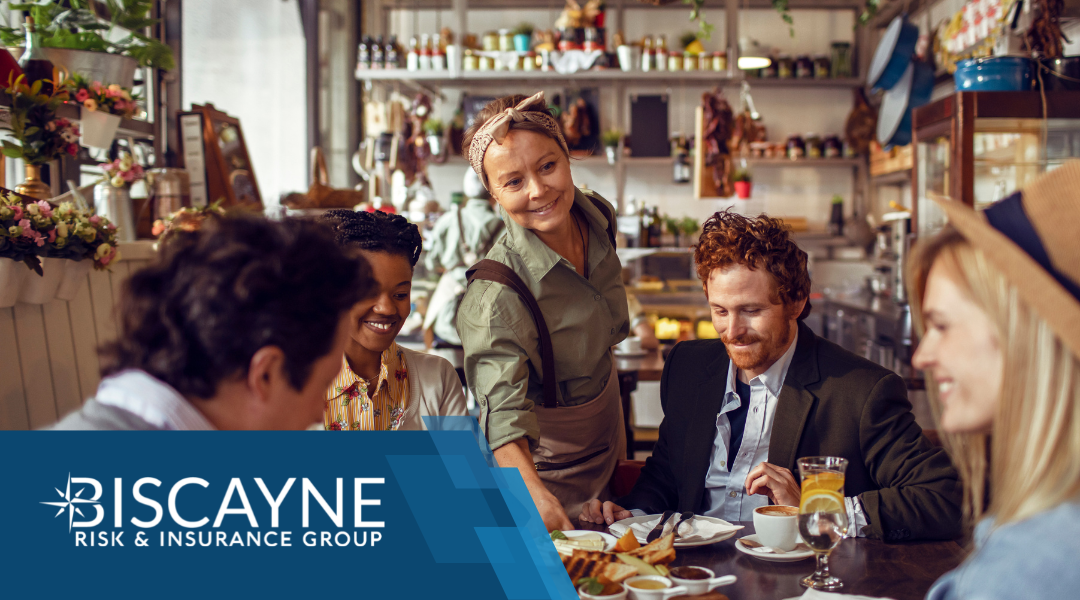Owning and operating a restaurant can be risky for business owners. Restaurants can be held liable for accidents in the kitchen, the dining room, or other areas of the restaurant. Employees are likely working closely with open flames, sharp utensils, and slippery floors. Customers bring another level of risk. Despite this, there are ways to mitigate such risks to protect your restaurant business.
Worker Injuries
Risk
Restaurant workers spend a lot of time inside a kitchen where they could be injured. Risks that workers are exposed to include: using sharp knives, walking on slippery floors, carrying heavy items, and working around open flames and hot stovetops.
Solution
Consider requiring your employees to participate in training sessions that will educate them on how to properly use and store dangerous kitchen items. That training can include different techniques on how to carry heavy items, selecting slip-resistant shoes, and using heat-resistant kitchen safety gear.
Many states require businesses to provide workers’ compensation insurance. It will help ensure your employees can receive certain benefits covering medical expenses if there is a work-related injury or illness.
Customer Injuries
Risk
Busy restaurants have a lot of people moving around them. Accidents can very easily happen inside a bustling building. Customers could trip over furniture or slip on a wet floor. You also have to remember injuries customers can sustain from dietary risks. Some customers can have food allergies that they may or may not disclose. Despite this, there have been legal cases made against restaurants for this reason.
Solution
Restaurant owners can implement safety measures that include keeping walkways clear of clutter to reduce the chances of falls. Installing railings in the restaurant can be another help to customers who may need extra assistance to keep their balance. In some cases, restaurants that operate in snowy climates will need to make sure they have salt available to melt outdoor surfaces around the property that could become icy.
Employees should be trained on cleaning up messes and potential hazards as soon as they are noticed. Food safety should also be a training priority. Employees need to know about cross-contamination and food poisoning. Restaurants should list allergens on the menu. Train employees on the importance of washing their hands, using disposable gloves, and wearing hairnets. Proper food storage will ensure another level of food safety for your restaurant.
Equipment Failure
Risk
Restaurants depend on equipment such as stoves, dishwashers, computers, and air conditioning. If any of these equipment items are not working properly it could impact sales or even cause a business to shut down. You can’t expect customers to comfortably dine in a restaurant without air conditioning. A restaurant is effectively shut down if the stoves are not in working order.
Solution
Performing regular maintenance on your equipment will keep things operating correctly. It allows restaurant owners to begin working on any equipment issues before those issues worsen. This is also a cost-saving measure that will benefit owners in the long run.
Also, it might be a good idea for a restaurant to obtain equipment breakdown coverage. This will ensure you can get your equipment up and running again quickly. Make sure you select a policy that covers costs, labor, or can replace equipment that is beyond repair.
Alcohol Liability
Risk
When your restaurant obtains a liquor license, your business becomes liable. If someone gets injured after consuming alcoholic beverages from your restaurant it could lead to legal issues. Another risk comes when someone is inebriated at your restaurant and causes property damage.
Solution
You must train your employees to deal with alcohol service. This includes making sure they know the signs of alcohol intoxication. Other measures restaurant staff will need to know include denying customers service and how to handle situations like this that may involve security or law enforcement.
Businesses that sell liquor need to have liquor liability insurance. This will protect your business from financial losses. It can also cover legal costs, court fees, etc.
Biscayne Risk & Insurance – Helping You Identify and Mitigate Risks
We’ll help protect your business from risks with our insurance coverage options. We offer a variety of insurance solutions such as general liability, professional liability, liquor liability, and cyber liability. Our risk management services will help you learn what kind of risks your business presents. We’ll also walk you through how to best mitigate those risks to protect your business. It’s easy to get started! Simply click here to get in touch with our team.

